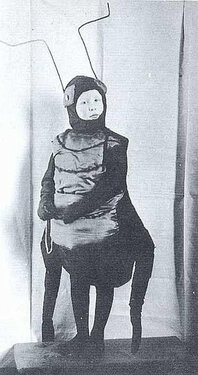What does it mean to be a Lolita? According to Momoko Ryugasaki, it’s not just a matter of frilly clothes:
I have no strength, no stamina. I run really slow, and I can’t even swim. I’m hopeless at sports or anything physical. but I am quite happy with these failings of mine. After all, there’s nothing charming at all about a Lolita who can run a full marathon and clock a pretty good time doing it, is there? If a Lolita is assaulted by a hulking thug and uses judo to throw him over her shoulder, that’s just bad for her image. The weaker a girl is, the better. For a maiden, being frail and high-strung confers status. Once in a while at morning assembly there will be a girl who faints from anemia, and every time I see that I gnash my teeth with envy. Exasperating though it may be for those around her, a girl is decidedly cuter if she cannot do a single thing for herself — if she doesn’t even know how to tie her own shoelaces, I do not want to become the kind of woman who competently balances work and play, and is physically and emotionally robust, and is more suited to protecting than to being protected. I have no wish of becoming a woman of the world who has tasted both the sweet and the bitter things life has to offer. I don’t ever want to eat anything bitter — I plan on living my life by filling myself up with only the sweet. And if that gives me cavities, I’ll cry. If treatment is required, I’ll ask to go under general anesthesia because I hate pain. Call me a sissy and laugh if you will, but this is how a girl ought to be. She should just avert her eyes from the harsh realities and life and, without ever lifting a finger, dreamily devote herself to fantasies that will never come true. If she believes that one day those fantasies will miraculously come to pass, that’s all that matters.
Although Momoko, the narrator of Novala Takemoto‘s novel Kamikaze Girls, ((The Japanese title is Shimotsuma monogatari, or “Shimotsuma Story,” which is more accurate but less intriguing than the English-language one.)) calls herself a “Lolita,” there is no mention of Dolores Haze and Humbert Humbert in the book. Instead, the novel begins with a smart-alecky disquisisiton on the Rococo aesthetic — “… hey, round is cuter than square” — connecting it to punk and anarchism. Eventually Momoko gets around to talking about herself. She’s the high-school-age daughter of a Yakuza reject, whom she uncharitably but accurately calls “the Loser.” She lives out in the boonies near but not convenient to Tokyo, attempting to lead a Rococo life while surrounded by rice paddies in every direction. To raise money for more frills, she places an ad offering the counterfeit Versace clothing her father used to sell. Finally, on page fifty-two, Ichigo Shirayuri arrives on her elaborately tricked-out 50cc scooter to buy a jacket and begin the story:
The person had straight bleached-blonde hair down to her shoulders, wore blue eye shadow and bright red lipstick, and had on a navy-blue school uniform comprised of a short jacket and a very long skirt with a prodigious number of pleats, which dragged on the ground. On her feet were — well, it would sound good to call them “mules,” but actually they were cheap purple slip-on sandals of the type moms wear when going out to the neighborhood supermarket, and their sparkles glinted in the sun. Wow, a sukeban, and a super old-school one … Who knew bad girls wearing outfits like this still existed?
Although they represent mutually alien cultures, frilly-ass Momoko fascinates the hicktown Yanki. Ichigo frequently visits Momoko, and gradually a friendship develops, despite their having virtually nothing in common beyond outsider status. In the course of the novel Ichigo introduces Momoko to pachinko, the two search for a legendary embroiderer, Momoko gets more deeply involved with Lolita fashion, and Ichigo gets involved, too. The story culminates in a girls’ biker gang showdown, in which Momoko, to her credit, fails to live up to her ideal of the useless, helpless Lolita.
Takemoto didn’t worry much about plausibility when he wrote the novel. Although Momoko’s skill at embroidery is believable given her attitudes and history, what happens at her favorite clothing store is pure wish-fulfillment. What happens when she plays pachinko machines is plain fantasy. Ichigo’s unsuspected resource is just a little too convenient, if nicely ironic. And so on.
What salvages the book is Momoko’s voice. Sometimes playful, sometimes sarcastic, usually ironic and detached, the narration undercuts any latent sentimentalism. Momoko tries not to take anything seriously, and it’s not until the final pages that she lets her mask slip.
Kamikaze Girls was made into a movie, and apparently a pretty good one. I might track it down someday, though I expect that I’ll find it as disappointing as any other movie based on a book I like.





